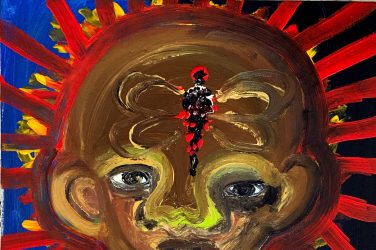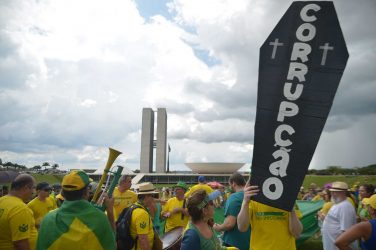 Reading Garrincha, Ruy Castro’s splendid study of the forgotten Brazilian right-winger and twice World Cup winner, I was reminded by the analysis of poverty made by Oscar Lewis more than thirty years before.
Reading Garrincha, Ruy Castro’s splendid study of the forgotten Brazilian right-winger and twice World Cup winner, I was reminded by the analysis of poverty made by Oscar Lewis more than thirty years before.
An anthropologist, Lewis, had spent several years studying the ‘culture of poverty’ which came out in Children of Sanchez in 1961. He argued that although its origins might vary, poverty was structured and relatively integrated into Latin American societies.
Its features included common interpersonal relationships including economic struggle, drunkenness and violence, overcrowded living conditions and a lack of privacy.
All this could be attributable to Garrincha, were it not for the fact that Lewis’s main point of reference was a Mexican family he studied during the 1950s.
But it was the life in which Garrincha was raised and seemed to escape before plunging back into it in the years before his ridiculously early death at 49.
Born in the town of Pau Grande, near Rio de Janeiro, in 1933, Manuel dos Santos’s first appearance was as surprising as it would be to those who would see him play in the years to come. His legs were crooked, with his left leg bent out and his right inwards.
The fifth of nine children, he was as small as a bird, which prompted his eldest sister to call him garrincha, the northeastern Brazilian word for a wren.
In a land where everyone seems to have a nickname, by the time he was four everyone, including his parents, were calling him by the moniker.
As a child Garrincha spent his time swimming, hunting and playing football. Uninterested in school, he left after a few years semi-literate.
He began work at the local factory, but showed little responsibility, turning up late if at all. What kept him employed was the wonder that he displayed for the local football team.
It wasn’t until he was nearly 20 that he finally got a break with a professional football club. However, it would take nearly a year for it to come about, following a visit to Pau Grande by Botafogo right-back, Araty Vianna, who insisted Garrincha visit the club for a tryout.
As fans would discover, Garrincha had no interest in the game other than playing it. Indeed, he didn’t think of the game in terms of wealth or success – he didn’t even follow the professional game as a fan, having gone hunting the day Brazil played its first World Cup final in 1950 with the rest of Pau Grande glued to the radio set.
So desperate were Botafogo to sign Garrincha he was urged to put pen to paper on a blank contract: a situation which would continue over the next decade with the club. His first games were sensational, scoring five goals in four games.
He caused havoc against left-backs, tiring them up in knots as he dribbled past them, beating them once, twice, sometimes three times in a row. With the ball at his feet he was brilliant, causing panics in defence and catapulting him into public consciousness.
And he wasn’t scoring only on the pitch. Already married, he would eventually have eight children with his first wife Nair, his childhood sweetheart. Another Pau Grande girlfriend he set up in a flat in Rio, with whom he had two children.
His second wife, the singer Elza Soares, with whom he lived for 15 years, bore him a son while at least two other children are known to be his. And that doesn’t include the other liaisons he had throughout his career, including with a showgirl who was girlfriend to the country’s vice-president and countless women he met while on tour with Botafogo in Europe and Central and South America.
Despite the efforts of the club to impose the concentração on its other players (a common process followed by all Brazilian clubs of the period whereby the team would be sequestered in a hotel from Thursday to Sunday to avoid distractions), Garrincha always managed a way of slipping out.
When he wasn’t having sex, Garrincha was drinking. Like his father, he drank copious amounts of alcohol and especially cachaça, the spirit made from sugar cane.
After games with Botafogo he would return to Pau Grande where he and his friends and relatives would pass the time drinking at his house and playing football.
Over the years greater numbers of people would turn up at his house and the drinking developed, including when he finally made the break with Pau Grande and moved in with Elza.
As well as the sex and alcohol Garrincha pursued his football in exactly the same way he approached everything else in life. Occasionally he would make an appearance at training sessions; more often than not, he failed to show.
Nevertheless, despite the sex, alcohol and failure to turn up at training, Garrincha was forgiven his waywardness as long as he continued to perform on the pitch. And perform he did.
In 1958 he was selected to play in the World Cup in Sweden. In their last warm-up match the team played against Italy’s Fiorentina and beat them 4-0.
Garrincha scored the final goal, going past three defenders including Robotti. With only the goalkeeper to beat he sold him a dummy and faced an open goal.
Robotti chased back, but instead of shooting Garrincha elected to go around him once again before walking the ball into the net. Although the goal was stunning it incensed his team mates and highlighted the difference between them and the man who played every game for fun.
Despite his antics Garrincha was a sensation in the World Cup, setting up several goals even though he failed to score. His role in winning the title 5-2 against the Swedes was followed four years later with another exhilarating performance in Chile, where he scored four goals against England and Chile in the semi-final.
Even though he was sent off he still managed to play in the final, helping Brazil beat Czechoslovakia 3-1 in the final.
Upon his return to Brazil he helped his club to a league championship, dazzling the crowd at the Maracanã stadium in a final game classic in December of that year. But that was to be his last game at his best.
Over the years the twisting and turning, dribbling and dummies had started to catch up with Garrincha’s legs. He was suffering great pain every time he played, but he couldn’t stop.
Nevertheless, he had to play, not only because his contract depended on him playing, but the lucrative tours which Botafogo undertook abroad were dependent on Garrincha turning out.
But there was to be little gratitude from the club’s directors for all the player had done. Negotiations for a larger salary were rebuffed as players less talented than him were offered more.
Around this time he set up home with Elza, resulting in widespread condemnation and abuse. Having put off the expected operation for several years, he was unable to delay it any further.
He eventually had it done with a doctor from another club which only exacerbated the deterioration in relations between him and his club. By 1966 Elza and he were both still feeling the heat from the media – him for treating Botafogo and his first wife with disregard, Elza for being a home wrecker.
Their enemies resorted to witchcraft to intimidate them; Elza and Garrincha made use of their own contacts to counter the influence. However, their luck didn’t seem to improve and they decided to move to São Paulo.
Garrincha signed with Corinthians and played enough games to get into the World Cup side which headed to England that summer. But the Garrincha of old was gone and he was no longer able to beat players as he had once done.
In 1968 he signed to Rio’s biggest club, Flamengo, but he was little more than a draw for the club in its tours; he wasn’t seen as a viable prospect in competitive games. Whereas his contemporaries were hanging up their boots, Garrincha seemed unable to do so.
A year later he was involved in a car crash in which his mother-in-law, Elza’s mother, was killed. He fell into a state of depression and attempted suicide: the first of several attempts.
Around this time the couple were threatened with kidnap, which prompted them to leave the country for Italy. For nearly two years they lived in Rome and Milan, Elza making an initial splash with her music, but Garrincha was unable to find any team willing to take him on.
He turned out for amateur sides and was eventually given a job advertising coffee at trade shows, his bosses unaware of the lack of Garrincha’s habits. By now he was drinking heavily and on his way to becoming an alcoholic.
Upon their return to Brazil – Elza’s initial success had not turned into anything long-lasting and Garrincha showed little inclination to better himself – the deterioration continued.
After he attacked her and their newborn baby in 1977 Elza left him. Not only was he abandoned by her, Garrincha’s daughters from his first marriage began to leave him as well (he had sought custody of the younger girls after the death of his first wife).
As the house was emptied, Garrincha found himself alone, with no furniture and only a few trophies and pennants from his playing days.
Eventually he was to be taken in by the widow of a former player who Garrincha was friendly with. He moved into her house in an estate in the working class neighbourhood of Bangu in west Rio with her father, brothers and son.
His drinking became worse, to the point that he was a danger to himself, falling asleep with a cigarette in his hand. Upon waking he would have the shakes and was unable to start the day without a drink.
He was approached by a charitable organisation to help run football clinics for underprivileged children. He became involved, but his situation was becoming worse; over the next five years he was repeatedly hospitalised and unable to break his addiction to drink, eventually passing away in early 1983.
For most people outside Brazil, Garrincha’s tragic tale is not much known. But whereas Pelé is the most commonly recognised football that the country has produced to outsiders, Garrincha is the one with whom most Brazilians associate.
Unlike Pelé, who managed to pull himself out of poverty, turning himself into an astute businessman and politician, Garrincha was the opposite. He lived from day to day and was utterly impractical when it came to money, spending it when he had it.
The fact that he managed to escape the poverty cycle for a few glorious years before being pulled back into it only serves to highlight the tragedy of his predicament – and the millions who continue to subsist in the same condition as he.
Oscar Lewis suggested that the culture of poverty was a way of life that was passed down. In the case of Garrincha, his approach to life was one that he seemed to inherit from his father, who was himself a charmer with the ladies, and relatives.
And despite the decade he spent at his peak (1953-1962) and the financial rewards he reaped in the process, none of it lasted. Even a testimonial game in 1973 which pitted a Brazil side against a foreign select team produced money which seemed to go down the drain.
Indeed, time does not appear to have improved matters for Garrincha’s offspring. Alex Bellos, the Guardian correspondent, whose Futebol: The Brazilian Way of Life (Bloomsbury, 2002) reintroduced Garrincha to British fans and encouraged the translation of Castro’s biography, recounts a journey to Pau Grande.
There he found both the footballer’s eldest sister, Rosa, and his second-youngest daughter still living in conditions no different to that which Garrincha would have known: dishevelled, poor and out of work. Whatever the lessons of history, the trials and tribulations of such lives seem destined to be repeated.
Garrincha: The triumph and tragedy of Brazil’s forgotten footballing hero
By Ruy Castro, translated by Andrew Downie
Yellow Jersey Press, 2004
416 pages, £17
Guy Burton was born in Brazil and now lives in London. A postgraduate student at the Institute for the Study of the Americas, University of London, he has written widely on Brazil both for Brazzil and on his blog, Para Inglês Ver, which can be read at http://guyburton.blogspot.com. He can be contacted at gjsburton@hotmail.com.








